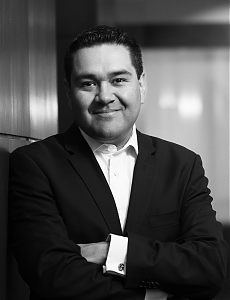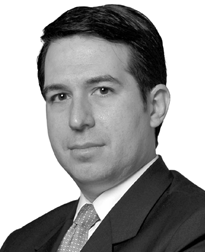TTR Dealmaker Q&A
March, 2015
AT&T acquires Iusacell from Grupo Salinas
Carlos Chávez
Galicia Abogados
Q: At what stage in the negotiations was Galicia retained?
A: We were retained in the early stages of the process. We were referred by AT&T’s US counsel, Sullivan & Cromwell, a firm we’ve worked closely with on a number of complex M&A transactions. We were selected for our M&A experience and for our strength in antitrust law. Our strength in telecom regulation also contributed to Sullivan’s recommendation. From management presentations to the deal close it only took four months. We had at least 15 fee earners involved, including six partners and we feel it was a good demonstration of our capacity to navigate complex regulatory terrain in a highly dynamic market.
Q: What market conditions set the stage for this transaction?
A: The Mexican mobile market is dominated by America Movil’s Telcel. Telefonica’s Movistar and Nextel are the other mobile carriers. What changed under the telecom reform law? It introduced the concepts of preponderance and asymmetric regulation, which requires the preponderant agent to share certain infrastructure and limits its ability to charge termination fees to other carriers and enter into exclusive dealing arrangements, among others. Together, these measures are designed to create a more competitive landscape and limit the power of the preponderant player.
Q: Why did it take so long for Mexico to legislate for greater competition?
A: The Telecom reform was one of the promises of the new Peña Nieto administration, along with certain tax, political and energy reforms. Many concepts in the new telecom act had been discussed since 2006, but did not become law as a consenus was not reached at the time. Telecommunications are a fundamental part of the development of an economy and Mexico is no exception. Market conditions at the time of the reform featured dominant players and no strong competitors. The will, the consensus to do something about it, finally allowed the 2013 amendments and the 2014 enactment of the Telecoms law.
“One thing that had an immediate impact was the elimination of restrictions on foreign investment in the sector”
Two new regulatory bodies were created, the Federal Telecommunications Institute (IFT) and the Federal Economic Competition Commission (COFECE), while the previous telecoms regulator, the Federal Telecommunications Commission (COFETEL), was dismantled. The result is a clear demarcation between general market-oriented regulation aimed at promoting competition and efficiency across all economic sectors in the case of COFECE, and oversight specific to the telecom and broadcasting industry by the IFT.
Q: How is the 50% market share threshold defining a dominant player measured?
A: This is part of what was left somehow open in the amendments. The 50% threshold is assessed on a national basis in the telecoms or broadcast services, based on number of users, subscribers, audience or on-network traffic. The position of the regulator has been that if an economic agent controls 50% or more of the entire market, using data from the main services comprising this market, such agent is a preponderant agent within the meaning of the constitutional amendments and the Telecoms Act.
Q: How was your client able to take advantage of the telecom reforms in this transaction?
A: While the main aspects of the reforms are yet to be applied, this transaction benefited from the changes relating to the new telecom regulator, IFT, and its jurisdiction. IFT is now a one-stop regulator with powers to review and clear a transaction like this, both from a regulatory and a competition perspective. We were able to file for clearance and obtain the same in an expeditious fashion, benefiting from the new rules in the Telecoms Act.
“IFT is now a one-stop regulator with powers to review and clear a transaction like this, both from a regulatory and a competition perspective”
Q: What antitrust considerations came into play in this transaction and how were these issues resolved?
A: We believe that the deal was seen favorably given everything established in the new law. One thing that the regulator did address was the historical relationship between Telcel and AT&T, which had been a minority shareholder of the Mexican company. The regulator made clear that there should be no ties between the two companies going forward. On the other hand, Totalplay Telecomunicaciones, a triple play subsidiary of Iusacell, had to be separated from the entities that AT&T acquired. IFT reviewed this separation prior to the closing and was satisfied with the result.
Q: What does AT&T’s acquisition imply for Mexico’s telecom market?
A: It’s a great prospect for the mobile market specifically to have a global competitor with a significant presence and an impeccable track record as a world-class operator.
Q: What other transactions could result from the telecom reforms of the past two years?
A: The first thing the market is waiting to see is what America Movil will do. Another pending issue is what will happen with Nextel, which AT&T has also bid for but has yet to close. Another important theme will be the tender of new public television channels. While public TV stations might have a limited lifespan ahead in more mature markets, in Mexico they are still important and the prospect of a third national network is still relevant. Another issue to consider is the impact of the reform for mobile virtual network operators.
Q: What will be the challenges for telecom operators competing under the new regulatory regime?
A: The first challenge, apart from the implementation of the reforms, is that there still is a preponderant player in the market. Also, it’s a challenge to have two new regulatory bodies with few precedents, few rules. There’s been enormous effort made to arrive here. The telecom market now requires a high level of sophistication from a regulatory and competition perspective.
“The telecom market now requires a high level of sophistication from a regulatory and competition perspective”
Q: What opportunities still remain in the telecom market and which companies are in the best position to take advantage of them?
A: Obviously under the new laws there will be opportunities. Despite the fact that there’s still a preponderant player, this is clearly a very interesting market. The penetration of smart phones is high and as broadband penetration increases, there’ll be more opportunities for additional service offerings.




